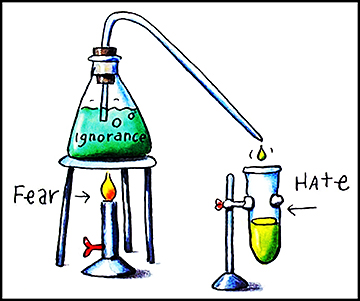Interreligious panel counters hate with informed dialogue
COFFEE WITH WARREN, with Warren Harbeck
Cochrane Eagle, April 16, 2015

A cartoon in Basheer Islam’s office challenges him to counter fear, ignorance and hate through education and dialogue. Drawing by James T. Pendergrast
Calgary coffee companion Basheer Islam treasures a drawing he has in his office. It reminds him why he works so tirelessly to promote interreligious understanding and goodwill.
The editorial cartoon by James T. Pendergrast originally appeared in Rolling Stone magazine and shows how ignorance and fear feed hate.
To counter this frightening formula for disaster, Basheer and members of his Ahmadiyya Muslim community in Calgary held their 7th Annual World Religions Conference at the Cochrane RancheHouse last Thursday evening. (See last week’s column.)
The evening featured a panel discussion on “Freedom of Expression and Respect for Religious Sanctities.” Four panelists represented Baha’i, Christian, Muslim and Stoney Nakoda First Nation views. I served as moderator.
Joan Young, an educator from Carstairs, represented the Baha’i view.
“The Bahá’í conception of social life is essentially based on the principle of the subordination of the individual will to that of society,” she said. “It neither suppresses the individual nor does it exalt him to the point of making him an anti-social creature, a menace to society.”
The press, in particular, must understand itself as a “mirror of the world” and be “fair-minded, painstaking in their inquiries, and ascertain all the facts in every situation.”
In this regard, then, exercising freedom of expression should be free of malice, and not lead to death and horror, she said. Freedom of expression should “advance civilization.”
Well-known Morley artist Roland Rollinmud shared a Stoney Nakoda traditional view.
The historic Stoney way was not based on books of sacred writings, but on life in harmony with nature and with each other, he said. “Night sings, Day sings, and God speaks through you.”
Respect is the heart of the matter, he said. Lack of respect leads to conflict. And practicing respect must begin in the home. “Take care of your own family and have harmony. If your guitar is out of tune, nobody will dance.”
When life is in tune, it can be beautiful – as beautiful as the sacred mountains. And looking beyond the borders of his own community, he said, “Now is the time we must work together and make Canada beautiful.”
Dr. Kevin Peacock, a professor at the Canadian Southern Baptist Seminary, Cochrane, set forth an Evangelical Christian understanding of the question.
“The Christian belief in freedom of expression is rooted in the doctrine of ‘the image of God’ presented in the first chapter of the book of Genesis,” he said, where God says, “Let us make mankind in our image.”
Freedom of expression is a right enshrined in both the American Bill of Rights and the Canadian Charter of Rights and Freedoms. Together with freedom of choice, it implies the moral obligation to exercise that right when necessary, as with matters of health, so with matters of religion.
Salman Khalid, engineer, is vice-president of the Ahmadiyya Muslim Community in Calgary.
Citing the Qur’an, he said, “Everyone has the right to disagree.” Even with respect to religion, there is to be “no compulsion; ‘Let him who believes believe and him who disbelieves disbelieve.’”
Even blasphemy is to be tolerated, he said. “Work towards prevention by respecting others, or by leaving the place, or by offering peace, but no physical action is allowed.”
But “hateful propaganda and bullying” are not acceptable and “authorities need to take serious action.” Does Islam give an individual the right to react with violence? “Never!”
All the panelists agreed that practicing the Golden Rule (“Do unto others as you would have them do unto you”) underlies all responsible religious behaviour.
Following the all-too-brief evening, Basheer emailed me a copy of Pendergrast’s drawing and told me how pleased he was with the panelists’ remarks. He praised each of the speakers for doing their part to help realize his Ahmadiyya community’s vision:
“Love for all, hatred for none.”
© 2015 Warren Harbeck
JoinMe@coffeewithwarren.com